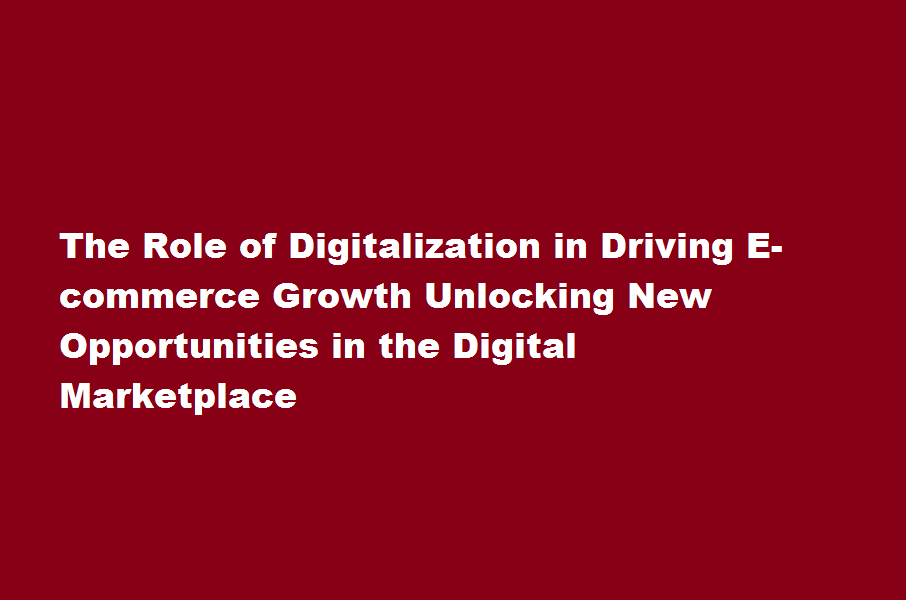Digitalization in Driving E-commerce Growth Unlocking New Opportunities
3 min read
Introduction
In the digital era, e-commerce has emerged as a powerful force in the global economy, transforming the way businesses operate and consumers shop. At the heart of this revolution is digitalization, which has played a pivotal role in fueling the growth of e-commerce. This article delves into the ways digitalization contributes to the expansion of e-commerce, empowering businesses to leverage technology and unlock new opportunities in the digital marketplace.
Expanded Market Reach
Digitalization has eliminated geographical boundaries and enabled businesses to reach a global customer base. Through e-commerce platforms and online marketplaces, businesses can showcase their products or services to customers worldwide. This expanded market reach provides businesses with access to a larger pool of potential customers, allowing them to tap into new markets and diversify their revenue streams.
Enhanced Customer Experience
Digitalization has revolutionized the customer experience in e-commerce. With intuitive website interfaces, personalized recommendations, and seamless checkout processes, businesses can provide customers with a convenient and streamlined shopping experience. Features like real-time customer support, user reviews, and social proof contribute to building trust and loyalty among customers, resulting in repeat purchases and positive word-of-mouth referrals.
Data-Driven Decision Making
Digitalization enables businesses to gather and analyze vast amounts of data, providing valuable insights into consumer behavior, market trends, and preferences. By leveraging data analytics and artificial intelligence, businesses can make data-driven decisions to optimize their e-commerce strategies. They can identify customer segments, tailor marketing campaigns, optimize pricing strategies, and refine product offerings based on data-driven insights, leading to improved customer satisfaction and increased sales.
Seamless Inventory Management
Digitalization streamlines inventory management for e-commerce businesses. With integrated inventory management systems, businesses can track stock levels, automate replenishment processes, and manage product catalogs more efficiently. Real-time inventory updates prevent overselling or stockouts, ensuring a seamless shopping experience for customers. Automated systems also enable businesses to optimize their supply chain, reducing costs and improving overall operational efficiency.
Targeted Marketing and Personalization
Digitalization empowers businesses to target their marketing efforts with precision and personalize customer experiences. Through digital advertising platforms, businesses can target specific demographics, interests, and behaviors, maximizing the impact of their marketing budgets. Personalization features, such as dynamic content, product recommendations, and tailored promotions, enhance customer engagement and drive conversion rates, ultimately boosting sales and customer loyalty.
Mobile Commerce
Digitalization has fueled the rise of mobile commerce or m-commerce. With the widespread adoption of smartphones and tablets, consumers can now shop anytime, anywhere, using mobile apps or responsive websites. Mobile-friendly interfaces, secure payment options, and features like mobile wallets and one-click ordering have made m-commerce a convenient and preferred mode of shopping. Businesses that optimize their e-commerce platforms for mobile devices can tap into the growing mobile consumer market and stay ahead of the competition.
Frequently Asked Questions
How has digitalization revolutionized the retail industry?
Digitalization has revolutionized the retail industry by enabling businesses to expand their online presence, leverage data analytics for informed decision making, enhance customer experiences, and optimize supply chain and inventory management processes.
What are the benefits of digitalization in e-commerce for small businesses?
Digitalization offers small businesses the opportunity to compete on a level playing field with larger enterprises. It provides cost-effective marketing channels, access to a global customer base, streamlined inventory management, and the ability to gather and analyze customer data for targeted marketing strategies.
How does digitalization contribute to e-commerce security?
Digitalization has led to advancements in e-commerce security through secure payment gateways, encryption technologies, two-factor authentication, and fraud detection systems. These measures help protect customer data and ensure secure online transactions, building trust and confidence among consumers.
Can digitalization help businesses adapt to changing consumer preferences?
Yes, digitalization enables businesses to adapt to changing consumer preferences by providing real-time insights into customer behavior and preferences. This information allows businesses to tailor their product offerings, marketing strategies, and customer experiences to meet evolving consumer demands.
Read Also : The Impact of Digitalization on the Education Sector Revolutionizing Learning in the Digital Age






